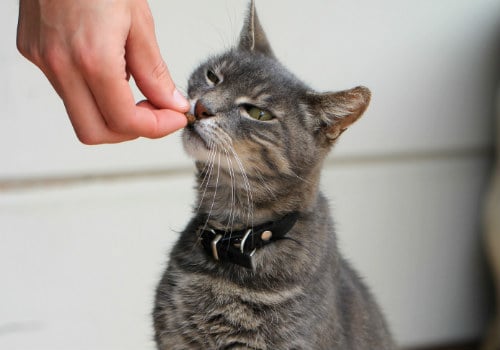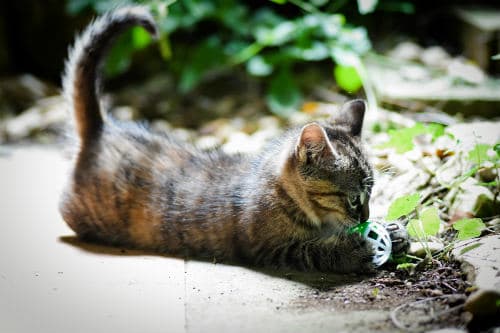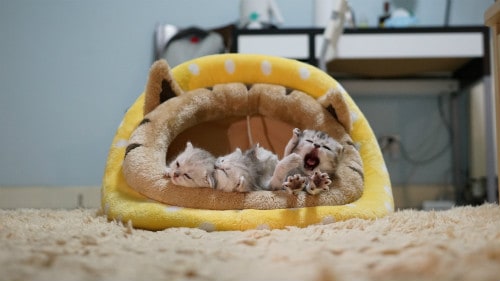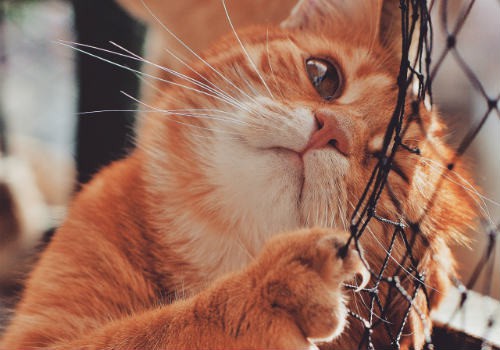All cats have basic needs, and providing them with those will help your cat live a long, healthy life. If your cat’s basic needs go unmet, he or she may feel stressed, which can create a negative effect on health and behavior. Listed below are some of the necessities you should provide to keep your cat healthy and happy.
Keep in mind that spending lots of money on fancy toys and intricate obstacle courses are hardly necessary. Your cat needs your love and attention, so making your home cat-friendly is all he or she really needs.
Feeding Your Cat

Cats need animal protein and are healthiest when eating a carnivorous diet. They have no reason to eat grains, tubers, or fruit. Cats are ill-equipped to process carbohydrates, so avoid those cheap commercial cat foods that claim otherwise.
[amazon bestseller=”cats wet food”]
Ask your veterinarian to suggest high-quality cat food for your pet. Several factors will contribute to the choice you make, including your cat’s age and how active they are. Cats tend to be finicky, so it might take a while to match his or her tastes.
You will want to find a cat food with taurine, an amino acid that protects heart and eye health. Your cat’s age is critical when determining the food he or she eats. A proper diet will include food with taurine.
Always provide fresh, clean water. Wash and refill your cat’s water bowls every day. Limit treats to less than ten percent of your cat’s diet. A cat should avoid foods that contain onion and garlic powder–they are poisonous.
Cats get plenty of moisture from killing and eating mice. However, now that many indoor cats subsist on a diet of dry food instead of hunting prey, you must encourage him or her to drink water. Give your cat canned wet food often and provide numerous water bowls throughout your home.
Please note: just like humans, cats can be lactose intolerant. If your cat happens to be lactose intolerant, when he drinks milk, undigested lactose moves through the intestines, drawing water with it. Bacteria can build up and ferment in the colon–this produces fatty acids.

Often, cats that drink full-fat milk will have diarrhea. Forget the “Tom and Jerry” cartoons: your cat doesn’t need to drink cow’s milk. If your cat incurs diarrhea, vomiting, and/or lethargy for more than two days, please call your veterinarian.
One expert recommends offering your cat wet food in a bowl and placing dry food in toys or puzzles. That way, you stimulate your cat’s intellect and activity level. Not to mention, it’s fun for both of you!
Bowls for Your Cat
Avoid plastic bowls because bacteria and oil will build up in the scratches and may lead to cat acne, which shows itself as black dots on the chin. Bowls made of ceramic or stainless steel are best. And experts tell us that cats prefer wide, shallow bowls.
[amazon bestseller=”Pet Bowl Stainless Steel”]
When cats stick their faces too far into bowls to eat, they may experience discomfort. Some cats are very sensitive to the feel of the dish around their whiskers, and others might dislike a deep bowl if they are unable to look around. Cats need to feel in control of their environment.
Take your time when deciding where you place your cat’s food bowls. Keep the bowl far from the litter box and be sure to provide them a private place to eat. Otherwise, they may become stressed out.
If you own more than one cat, be sure to provide each one with plenty of room away from the other. Place the bowls apart–cats are solitary hunters and get annoyed when another eats too close to them.
Your Cat’s Behavior

If your cat shows undesirable behavior, jumping on the table or eating a plant, for instance, try to redirect the naughtiness while it’s happening. That way, your cat will make the connection between their behavior and the redirect. Cats respond well to praise; however, they ignore forceful reprimands.
If you try to redirect the behavior too long after it occurred, your cat may become scared of you and his surroundings. When you do catch your cat misbehaving, distract him or her, as you would with a toddler. Make loud noise or shake some keys.
To help your cat behave, keep forbidden areas, such as kitchen countertops, free of shiny or noisy objects. Cats love to sneak inside plastic or paper bags, for instance. Also, try your best to keep food, glasses of water, or chip clips off the counter or other forbidden surfaces.
Cats love to perch up high and look out the window. Move their scratching post, or tree, or whatever tall “legal” perch they have next to the window. Also, you can hang a bird feeder outside the window and encourage a new perch.
Fix leaking faucets, which may draw your cat to them with the sound and promise of water. If feasible, provide your cat with his or her fountain. These may be found at local pet stores.
Remove any furniture, a chair or end table for instance, if it’s helping your cat misbehave. If your cat seems to get bored quickly, play with him or her more often. Sometimes, animals will misbehave simply because they are seeking attention.
Cats dislike sticky surfaces. Perhaps you can place double-sided tape on old placemats and scatter them over the counter. Your cat may learn after only one jump that they did not like their paws sticking to the surface!
Remember to reward your cat’s positive behavior. If he or she leaps onto the scratching post instead of the counter, give her plenty of praise or a tasty treat. Just like humans, animals will repeat the behavior that provided them the most pleasure.
Space for Your Cat

Cats like to feel they are in control of their surroundings and that they have chosen to change anything they dislike. However, when you introduce something new, such as food, toys, or cat litter, you’ll want to respect their boundaries. Experts recommend using an old container and a new container and then letting your cat choose which he or she prefers.
Give your cat their own room, or at the very least a space that they see as their own. Set up the food and water, a bed and a litter box, toys, and blankets. Also, if there’s room, provide a scratching post, several perches from which he or she can peer out the window, or a condominium.
Cats love to look out the window. Be sure there are places for him or her to watch “Live TV” from a perch. Your outdoor cat will have more freedom; however they still will enjoy sitting on the back of a couch or on a table (just for them) and gaze out the window.
Keep the food and water bowls away from anything harmful, such as appliances, or heaters and/or air conditioners, which could make a sudden noise that scares your cat. Also, since they are predators, cats prefer to see who’s coming and not being vulnerable.
Your cat’s space in your home should remain clean, dry, and provide comfort for her in which to rest or sleep. If you purchase a cat bed, line the bottom with a soft towel or warm blanket. Change and wash the bedding often, especially if it becomes soiled.
If you have a cat that will go outdoors to venture through neighborhoods, be sure to equip him or her with a collar and ID tag with your information. You may choose to have your cat microchipped as well in case he or she gets lost or taken. Shoot for a collar made of sturdy material like vinyl or leather.
Please note: indoor cats live longer than outdoor cats. Indoor cats can avoid the risk of getting hit by a car, fighting with other animals, or getting eaten by larger predators. Moreover, indoor cats are less likely to get fleas or ticks or contract a disease.
Cat Scratch Fever

Cats need to scratch their nails against objects. That said, although he or she might not fall for it, provide them with a scratching post of some sort. (They tend to love scratching your furniture!) When your cat uses the scratching post, give him or her plenty of positive reinforcement.
When a cat scratches against a surface, their outer nail sheaths come off to reveal sharp, smooth claws. You can trim your cat’s nails every two to three weeks to prevent injuries to your family members or your furniture. Provide your cat with a tall, sturdy scratching post covered with burlap or tree bark.
[amazon bestseller=”cats scratching post”]
The Litter Box
Indoor cats need a litter box. Just as you prefer privacy when you go to the restroom, place your cat’s litter box in a quiet location. Some experts recommend one litter box per floor of your home. And once you place the box, avoid moving it because you will upset your cat’s environment.
Because cats are finicky and discerning, they may refuse to use a dirty, stinky litter box. Choose a premium cat litter where you can scoop the solid waste out easily, and do this every day. (Try the clumping litter!) At least weekly, you should dump the entire container, wash it, and refill with fresh litter.
Please note: avoid using heavy deodorants or scented litter, because your cat may avoid the litter box afterward. If you have made no changes and your cat still refuses to use the litter box, consult your veterinarian. A cat who can’t urinate may have a serious medical issue.
[amazon bestseller=”cat litter box”]
Your Cat’s Overall Health
At least once a year, take your cat to the veterinarian for a check-up and shots. If there is an emergency, take him or her to the vet clinic right away. Never give a cat human over the counter medicine, especially acetaminophen–it can kill them!
When you visit the vet, bring any necessary paperwork so you can have evidence of shots, medicines, and clean bills of health. If you have to travel with your cat, you will be so grateful you have the documents! Be sure to have your cat spayed or neutered, and you can do this as early as five months of age.
If you think your cat may have ingested something poisonous, call your local veterinarian. You may also call the ASPCA Animal Poison Control Center for 24-hour consultation: 1-888-426-4435.
"In ancient times cats were worshipped as gods; they have not forgotten this."
-- Terry Pratchett





